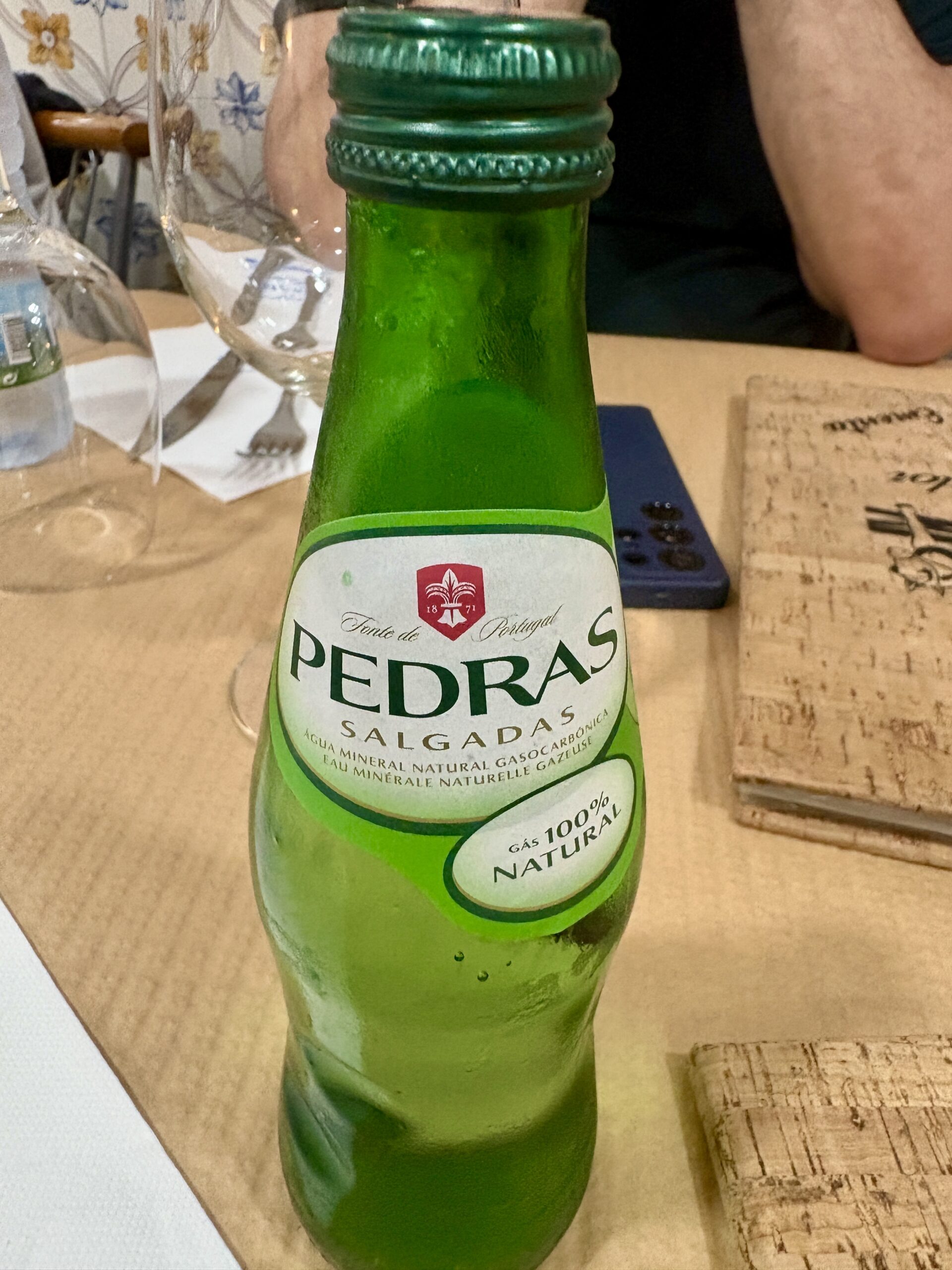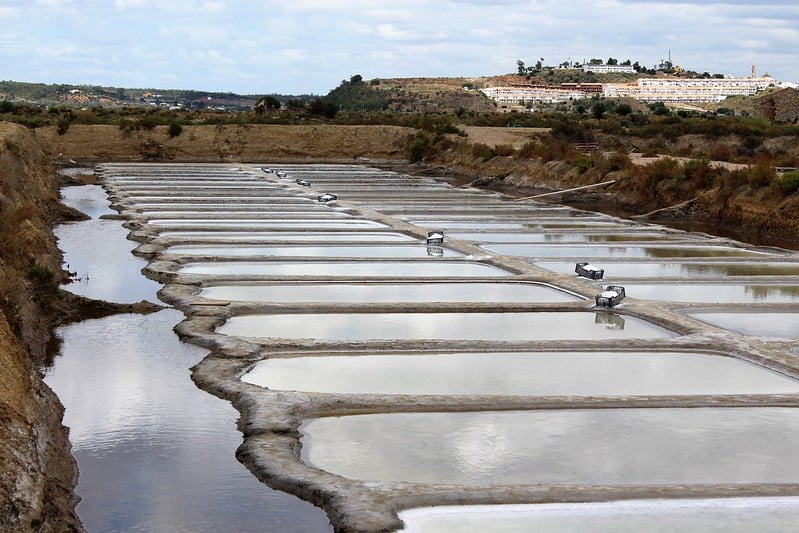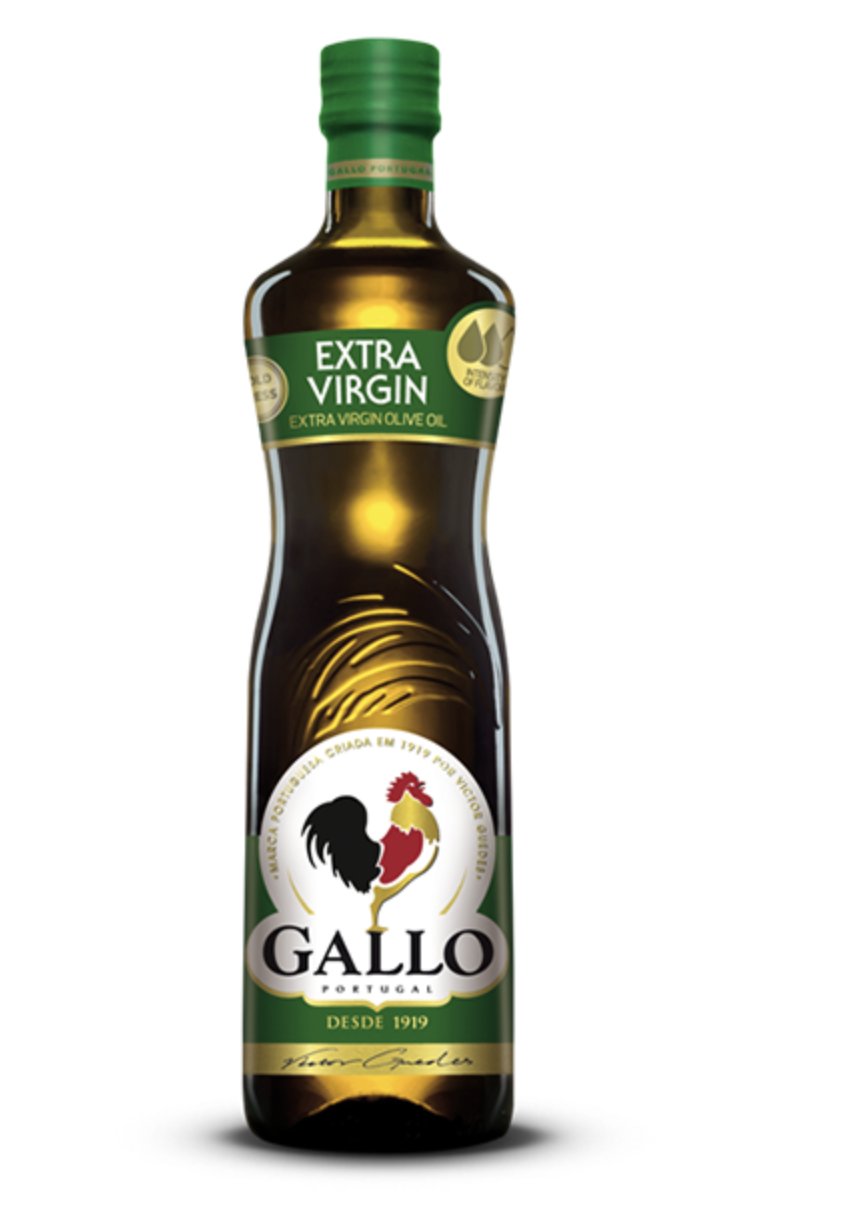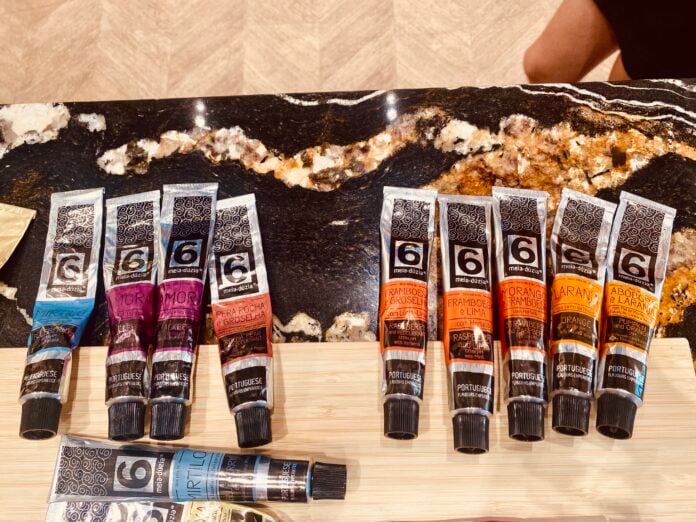Portuguese cuisine has earned its reputation around the world with simple ingredients that have been elevated by craft, climate, and centuries of knowhow. If you want to bring that flavor home or taste it as locals do, we wanted to introduce five food brands that define quality in Portugal today. Of course, there are many more amazing Portuguese food brands out there, but these are some of our favorites and the brands we return to again and again. Below you will find the stories behind each brand, why they stand out, and how to enjoy them.
1. Pedras – Portugal’s Favorite Sparkling Water
Pedras is the mineral water you will spot on café tables from Porto to Faro. It rises naturally carbonated from the springs of Pedras Salgadas in Trás-os-Montes, a spa town whose waters were prized in the nineteenth century and bottled nationwide by the 1890s. The brand’s history is closely tied to the region’s thermal park and to the evolution of Portugal’s beverage industry, which today falls under the Super Bock Group, the country’s largest beverage company and owner of the Vidago and Pedras Salgadas thermal parks.
What makes Pedras distinctive is that its water is all natural rather than injected. This results in small, persistent bubbles and a mineral structure that many Portuguese consider food-friendly. The brand emphasizes that Pedras flows naturally sparkling from the depths of the earth. They highlight the rarity of water that remains carbonated from source to bottle. If you like pairing sparkling water with food, Pedras is a classic match for grilled fish, salted almonds, and anything fresh off a charcoal grill.
How to try it: Order a chilled green glass bottle at any tasca or buy multi-packs at supermarkets. You can also try different flavors of sparkling water. Our favorite is passionfruit! If you visit the Pedras Salgadas Park, you can combine a tasting with a stroll among historic spa buildings restored in the 2000s.

2. Salmarim – Portugal’s Finest Salt
Portugal’s most famous salt comes from the salinas of the Algarve, and Salmarim is a name adored by both chefs and foodies. This small, family-run company produces fleur de sel and sea salt in Castro Marim, a landscape of marshes and salt pans where salt has been gathered since antiquity. Salmarim’s own history has second-generation salt maker Jorge Raiado ensuring that the salt’s delicate crystals finish dishes without harshness.
To understand why Algarve salt is so special, you need to consider the land where it is harvested. These salinas sit inside protected wetlands with long, hot summers. Workers called marnotos skim the fragile flower of salt from the surface by hand, then dry and pack it with minimal handling. The Algarve also hosts Portugal’s only PDO (Protected Designation of Origin) for sea salt, Sal de Tavira and Flor de Sal de Tavira, which codifies traditional, additive-free methods in the Ria Formosa lagoon. While Salmarim’s base is Castro Marim rather than Tavira, both areas share the same craft culture that delivers nuanced, crunchy crystals with natural trace minerals. You can use them to finish grilled dourada, ripe tomatoes, or charcoal-roasted cabbage.
Look for Salmarim’s tins and cork-lidded jars in gourmet shops across Portugal, or visit Algarve salt pans for tours during harvest months.

3. Gallo – Portugal’s Classic Olive Oil
Ask a Portuguese home cook which olive oil brand they grew up with and many will say Gallo. Founded by Victor Guedes and registered as a brand in 1919, Gallo grew from a factory in Abrantes to one of the most recognized Portuguese food names worldwide, now part of the Sovena Group. Over a century later, its extra virgin bottles continue to collect international awards and define the baseline for everyday Portuguese flavor.
Gallo succeeds by offering consistency across styles whether its gentle oils or more peppery blends that accent grilled meats. Its flagship Clássico has placed well at competitions like NYIOOC and Olive Japan in the past. This reinforces the brand’s balance of approachability and quality. For salads, caldo verde finishes, or dipping with fresh pão bijou, a medium-intensity Gallo extra virgin is a safe and satisfying choice.
Every supermarket stocks Gallo in multiple sizes. If you want to explore, compare Clássico to a more robust seasonal harvest. Drizzle it over grilled sardines, spoon it over warm beans and garlic, or perfume a simple tomato rice.

4. NURI by Conservas Pinhais – One of Portugal’s Oldest Sardine Brands
If you visit a Portuguese delicatessen and ask for the good sardines, chances are a clerk will slide you a colorfully wrapped tin of NURI. The brand belongs to Conservas Pinhais & Cª, a Matosinhos cannery founded in 1920 that still hand-prepares fish the old way: selecting fresh sardines, cleaning and packing by hand, layering with pickles and spices, and then sealing and cooking so the fish absorbs the aromatics. The process is slow, labor-intensive, and central to NURI’s reputation among collectors and chefs.
Many NURI lovers buy multiple tins and age them for one to three years to deepen flavor and soften the bones. For a rich pantry meal, warm a tin, pour over toasted country bread, and finish with raw onion and a squeeze of lemon.
Context matters here. Portugal is home to the world’s oldest operating fish cannery, Ramirez, founded in 1853, a reminder that the country’s canning tradition is long and varied. Ramirez remains a benchmark in its own right and a pillar of the national industry. However, for a singular, artisanal sardine experience, NURI has become a symbol. You can even tour the museum at Pinhais to watch tins being made by hand.
You can find NURI in speciality grocery stores or at the Conservas Pinhais Factory Tour in Matosinhos. Buy both the plain olive-oil sardines and the spiced version and then hold a side-by-side tasting at home with chilled vinho verde. Perfection…
5. meia.dúzia – Artistic Portuguese Jams
For dessert boards and gifts, Portugal has an inventive brand that packages tradition with modern flair: meia.dúzia. The company began in 2012 when two siblings from northern Portugal combined culinary training and artistic inspiration to create fruit jams, honeys, and chocolate spreads presented in aluminum tubes that resemble a painter’s palette.
meia.dúzia’s flavors are connected to the Portuguese land: Azores pineapple with mint, Serra da Estrela blueberry, Fundão cherry, or Madeira wine and orange. The brand opened its own shops, including a space on Porto’s Rua de Santa Catarina that showcases the art-meets-gastronomy idea. In the meia.dúzia shops, you can taste many different jams and chocolate spreads (and you will likely find it almost impossible to leave without taking at least one tube home).
Visit meia.dúzia boutiques in Porto or Lisbon (R. de Santa Just a 96, R. Nova do Almada 90) or browse gourmet stores across the country. The tasting boxes make excellent gifts and travel well in carry-on.
How to Build a Portuguese Tasting with These Five Brands
Bringing these products together makes a perfect aperitivo or light meal.
1. Start with Pedras
Chill bottles of Pedras and pour into small tumblers. Its natural carbonation refreshes the palate and pairs nicely with salty appetizers.
2. Lay down the salt
Set out a ramekin of Salmarim fleur de sel next to ripe tomatoes, olive oil, and crusty bread. Let guests season to taste. A finishing salt shows its character best on simple, juicy ingredients.
3. Drizzle with Gallo
Choose one medium-intensity Gallo extra virgin for salads and a more peppery bottle to finish grilled vegetables. The contrast demonstrates how blends can change a dish.
4. Open the sardines
Serve NURI sardines two ways: straight from the tin with pickled onions and parsley, and gently warmed and flaked over boiled potatoes dressed in olive oil. Offer a side of lemon wedges.
5. Finish with jams
Pipe meia.dúzia jam over slices of queijo da Ilha or creamy cow’s-milk cheeses. A citrus-or-wine-inflected tube rounds out the salty, savory flavors that came before.
It doesn’t get more Portuguese than this!
Final Tips
Check the labels to make sure that you take home the best quality from these brands. For olive oil, check harvest dates and look for extra virgin on the label. For sardines, age your tins. Many sardine lovers will keep NURI for a year or two to mellow the fish and integrate the spices. Buy several and compare over time. Taste side by side. Portuguese food culture is about nuance. Set up mini tastings to learn how each product behaves with bread, tomatoes, grilled fish, and cheese.
Start with these five brands and then keep exploring. There is truly no end to the magic of Portuguese cuisine!


